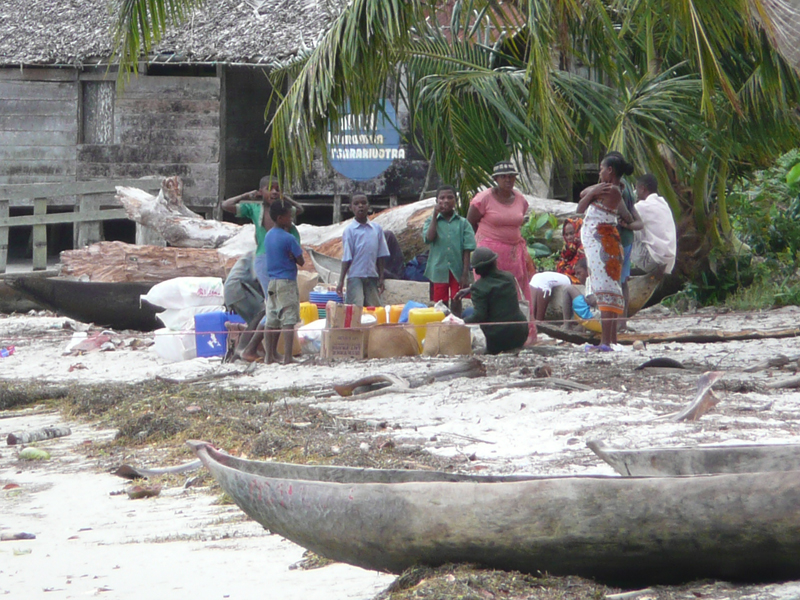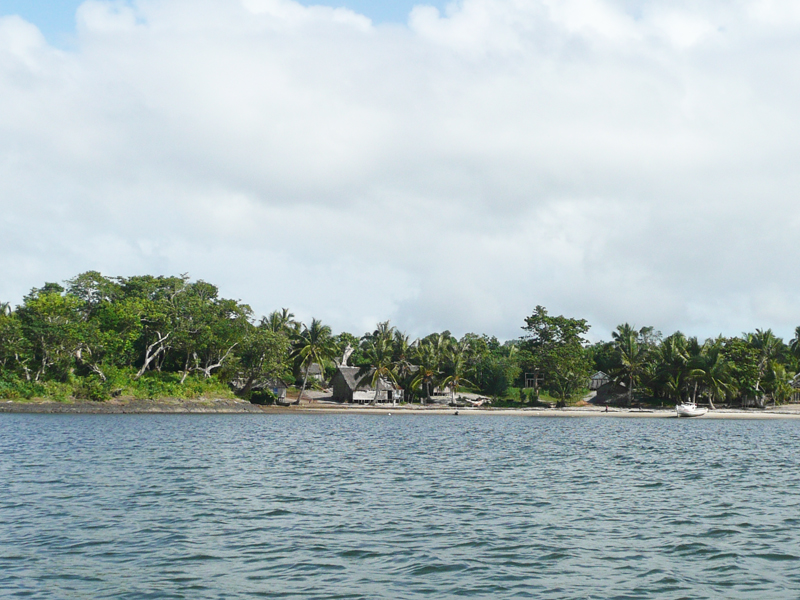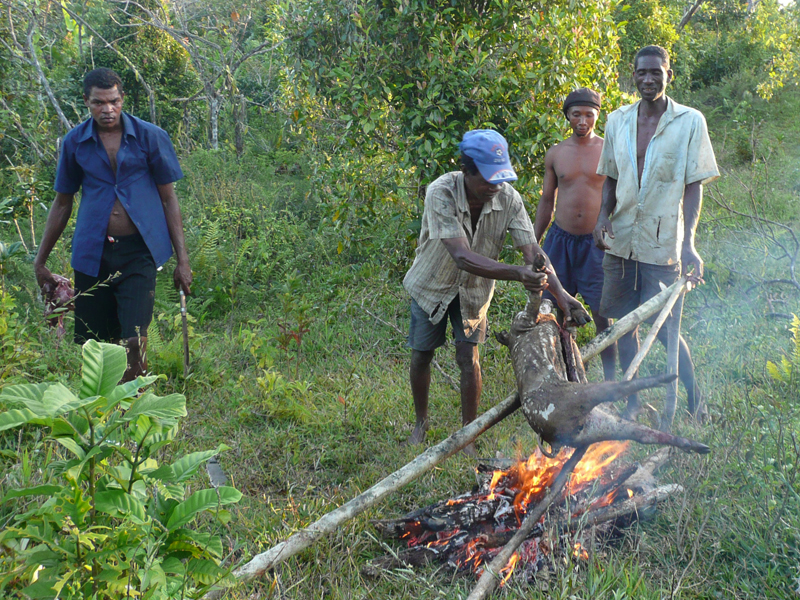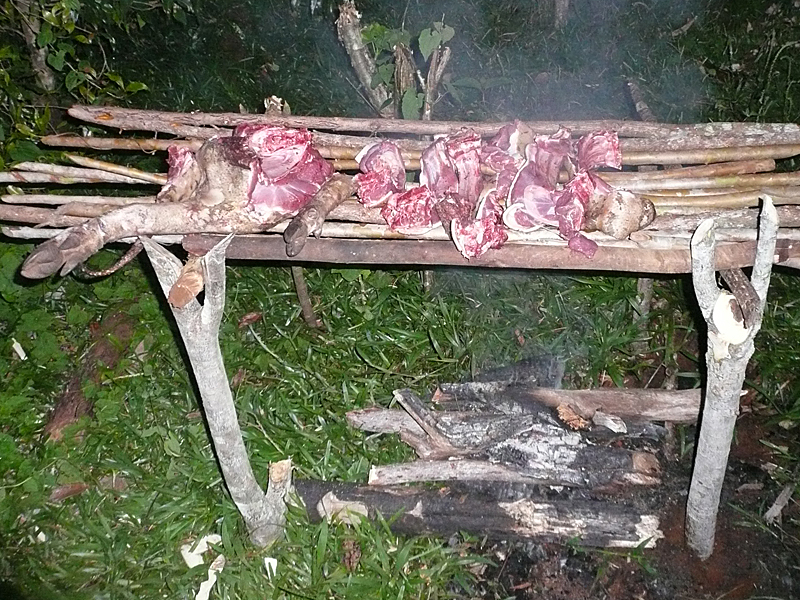An eventful final week in the jungle
When Sonja Hassold is temporarily arrested, she fears the worst. Then she has to eat nothing but wild boar for days on end – all thanks to breakdowns in communication, as the globetrotter author discovers.
After a four-hour trek, we eventually reach Ampanavoana utterly exhausted and look forward to a well-earned siesta. Just outside the village, however, we are whistled back by a man on his mobile. There is a brief discussion between the botanist Jao Aridy and the man, who turns out to be a gendarme in plain clothes. We have to accompany him to the station.
At this stage, I still haven’t got the foggiest idea of what’s going on. I didn’t understand a word of the conversation in Malagassi, other than that the gendarme was furious. I sit in the station with a face like thunder and try to make head or tail of the next conversation. I cannot, of course, so my imagination starts to run wild: what if the man hasn’t sanctioned our work and hands us over to a rosewood baron?
Policeman with a bad conscience
I am already at my wit’s end when they finally explain what’s going on. The reason for our “arrest”: Jao didn’t salute the plain-clothes gendarme! In Madagascar, you are supposed to salute them all. But how are you supposed to know if he is not in uniform? Beside myself, blinking away the tears, I try to explain my point of view.
The upshot of it all is that the policeman wants my mobile number and email address so we can keep in touch! After about two hours at the station, we are finally free to go and have a rest. The next morning, I learn that the gendarme, Arinely, felt so bad about the incident that he has invited us over for dinner. In all my time out in the field, I have never eaten so well. It’s a meal fit for a king: roast chicken, carrot salad with tomatoes and egg, pickled onions, warm zebu milk and candied patatas. Simply delicious.
After a few days’ rest in Ampanavoana, we embark on our last bike ride towards Vinanivao in the south of the Masoala Peninsula. The rigorous fieldwork is starting to take its toll and the four-hour journey is easily the worst on the east coast. However, the quaint little fishing village and Marie-Hélène’s snazzy bungalows that greet us when we arrive soon make up for it.
A touching gesture
From Vinanivao, we set off on our last week in the jungle. We head towards the region of Magniria, with the jungle right on its doorstep. We pitch our tents on a plot of land belonging to a large, eight-strong family who all live in one little hut. The family lives extremely modestly and as they don’t eat meat, they are all very skinny. Even so, the eldest daughter offers me her pillow for me to sleep on because I haven’t got one with me! I am deeply touched.
The first collecting expedition takes us along existing paths. At lunchtime, we reach a little village where we eat sano, a fabulous fruit. Families come by with all their children. Some want to palm them off on me so that they will receive a decent education. If I had taken them all, I would have returned to Switzerland with a crowd of children in tow!
Back at the camp, there is some exciting news: the men in the family have bagged a wild boar – the only animal they are allowed to hunt in the forest – and are in the process of burning off the hairs over a fire. Of course, they immediately ask us whether we would like to buy a hunk of meat. I nod and send Jao off to buy enough for two meals. I have no idea what went wrong with the communication, but we end up with half a wild boar for 10,000 ariary (about four francs)! To cure the meat, the guides dry it over the fire. The offal has to be consumed immediately, however. The lungs, liver, heart, spleen and kidneys: nothing goes to waste. Dinner is one thing, but we have the same for breakfast the next morning, too! For once, I have to pass and make do with rice.
Ointment that works wonders
On the second day of collecting, we walk along the most beautiful stretches of river, which form large pools every now and again and call out to you to jump in and have a dip. There are predominantly palisanders in these forests. You don’t find any large trees any longer as they were all cut down about ten years ago during the precious-wood boom here. After a wonderful day, a crowd has gathered to welcome us back to camp, all of whom want to know if I have got a camera with me. Suddenly, the yard turns into a photo shoot – a hilarious situation!
In the evening, I patch up the family: the father has gashed his thumb badly with a machete, the mother has scolded her thigh with boiling water and the eldest son has a gaping wound on his knee. One thing’s for sure: I’ll never leave home without any Vita-Merfen again! It has healed all manner of cuts and grazes in a jiffy during my fieldwork.
A nasty stomach upset and a painful goodbye
During the night, I get an attack of the shivers and start hallucinating. I end up spending the next two days in the camp with diarrhea and a temperature. Out here, the effects of losing your appetite are cataclysmic. Back in Switzerland, you just get someone to bring you some crackers and coke from the supermarket. In the jungle – a four-hour hike to the nearest reasonably sized village, where there is nothing but rice, dried fish, beans and dried wild boar meat – you waste away. Luck is on my side, however. I feel better after two days, so we hazard the trek back to Vinanivao, Marie-Hélène and some decent food.
We return to Maroantsetra from Vinanivao by motorboat, where I need to sort out some paperwork. Then, I bid a painful farewell to Jao, jet off to the capital Antananarivo, drop off my samples to be exported, and fly back to Switzerland.
Nearly three months of fieldwork in Masoala
are over. I have covered many kilometres on foot or by bike, experienced and
seen an incredible amount, and fallen in love with Madagascar – an impressive
and unique, but also baffling and divisive country.
About the author
Sonja Hassold (28) is a doctoral student in Alexander Widmer’s group, a professor of genetic plant ecology. From the end of August until the end of 2011, she worked in Masoala National Park in Madagascar, collecting wood samples from the local tree species for her thesis. She is investigating whether it is possible to differentiate Madagascan tropical woods genetically in order to combat the illegal trade in palisander and rosewood. The project is financially supported by Mercator Foundation Switzerland.











READER COMMENTS